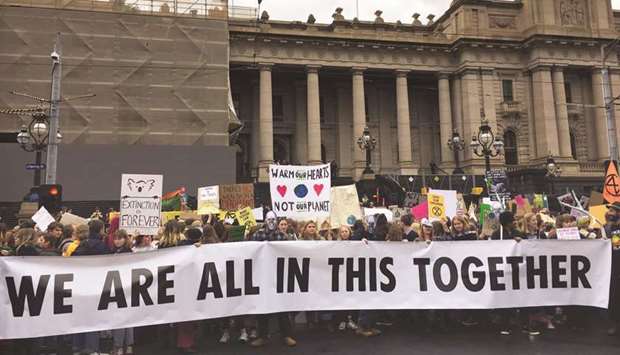Tens of thousands of pupils have skipped school in Australia and New Zealand yesterday to kick off the second wave of global school strikes demanding action on climate change.
Thousands of schoolchildren and adults took over the streets of Melbourne to pressure the government to take strong action, including the declaration of a climate emergency. It was led by the local branch of Extinction Rebellion, a British direct action group.
The protest disrupted public transport as demonstrators marched through the city and staged a “die-in” to show the Earth’s sixth mass extinction.
In Australia’s capital Canberra about two dozen students and adults protested at Northbourne Avenue in the city for several hours. Zahra Radih, 17, said she skipped school to protest in Canberra because “climate change is as important as education.” “We are learning for the future.
But if the government does not make climate action a priority we do not have any future,” the Year 12 student at Narrabundah College told DPA.
Eleanor Houghton, 12, who had come with her friends, said her parents supported her skipping school for the climate protest “as long as I don’t miss too many classes.”
“We want the government to stop approving coal mines and fossil fuels and invest in renewable energy. We are all very worried about the future,” she said, holding a placard that read “Stop Adani.” The controversial multi-billion-dollar Adani coal mine was one of the most divisive topics during last week’s federal election, which saw climate action-supporting Labor suffer a bruising defeat. “I am of course very disappointed with the election result, but we will continue to protest for climate action,” Radih said.
In New Zealand’s capital Wellington, the youngsters led a noisy protest to parliament where they urged politicians to do more to secure their future. There were also protests in more than 20 other towns and cities across the country.
National School Strike for Climate co-ordinator Sophie Handford told the New Zealand Herald that students want the government to declare a climate emergency. The first nationwide school strike for climate action on March 15 was overshadowed by the deadly attacks on two Christchurch mosques on the same day.
The worldwide protests in over 1,600 cities and towns in more than 100 countries were inspired by Swedish teen environmentalist Greta Thunberg. Thunberg has staged a weekly protest outside parliament in Stockholm since August 2018 that has spread and inspired students around the world to hold demonstrations calling for climate action under the Fridays For Future slogan. At least 1,623 protests were planned in 119 countries.
“We are one, we are back,” organisers said. A similar protest on March 15 drew hundreds of thousands of protesters in over 130 countries from Australia to Uruguay.
Thunberg was set to take part at a rally in the Swedish capital. In a video clip on Instagram, she also urged young Europeans to vote in the European Parliament elections that run from Thursday to Sunday. “If you, like me, are determined to bring attention to the ongoing climate and ecological crisis, and truly care about the future living conditions for all species, then going to vote is one of the most powerful things you can do,” Thunberg said. A month ago, Thunberg met Pope Francis on the sidelines of a Vatican event in St Peter’s Square, where the Catholic leader encouraged her to continue her activism.
The 16-year-old has also recently addressed members of parliament in London, world leaders at the World Economic Forum in Davos, Switzerland, and those attending the UN climate conference held last year in Katowice, Poland.

People at a rally led by Extinction Rebellion, call for action on climate change, in Melbourne, Australia.
